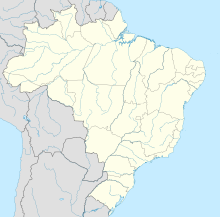Hercílio Luz International Airport
Florianópolis-Hercílio Luz International Airport Aeroporto Internacional de Florianópolis-Hercílio Luz | |||||||||||||||
|---|---|---|---|---|---|---|---|---|---|---|---|---|---|---|---|
 | |||||||||||||||
| Summary | |||||||||||||||
| Airport type | Public/Military | ||||||||||||||
| Owner | Infraero | ||||||||||||||
| Operator | Flughafen Zürich AG (since 2017) | ||||||||||||||
| Serves | Florianópolis | ||||||||||||||
| Elevation AMSL | 5 m / 16 ft | ||||||||||||||
| Coordinates | 27°40′13″S 048°33′09″W / 27.67028°S 48.55250°W | ||||||||||||||
| Website | Infraero FLN | ||||||||||||||
| Map | |||||||||||||||
| Runways | |||||||||||||||
| |||||||||||||||
| Statistics (2016) | |||||||||||||||
| |||||||||||||||
Florianópolis-Hercílio Luz International Airport (IATA: FLN, ICAO: SBFL), is the airport serving Florianópolis, Brazil. It is named after Hercílio Pedro da Luz (1860–1924), three times governor of Santa Catarina and senator. It is operated by Infraero. Some of its facilities are shared with the Florianópolis Air Force Base of the Brazilian Air Force.
History
The airport was built on the site of an old Air Naval Base, which operated until 1941, when its jurisdiction changed to the Brazilian Air Force.
Between 1927 and 1932, the then known as Campeche Field was also used by the French aviators of the Compagnie Générale Aéropostale for its operations in Florianópolis. Among them were Jean Mermoz, Antoine de Saint-Exupéry and Henri Guillaumet.
Between 1942 and 1945 the runway 03/21, apron, control tower and passenger terminal were built. At the same time, some facilities of the Florianópolis Air Force Base were built and made operational.
In the period between 1952 and 1954 the passenger terminal was rebuilt and was operational until 1976 when a brand-new terminal building and apron were opened. The old facility is today the cargo terminal. The new terminal was further enlarged in 1988 and 2000, reaching the present 8,703 m².
In 1978 the runway 14/32 was opened allowing a great increase in traffic. In 1995 the airport was upgraded to international category and started receiving particularly seasonal and charter flights from Argentina, Chile, and Uruguay.
On March 16, 2017, Flughafen Zürich AG was awarded the concession to operate and expand the airport, owning 100% of it and will operate it until 2047.[4]
Airlines and destinations
Passenger - Season 2016/2017
| Airlines | Destinations |
|---|---|
| Aerolíneas Argentinas | Buenos Aires-Aeroparque, Seasonal: Córdoba, Rosario |
| Amaszonas | Seasonal: Asunción |
| Andes Líneas Aéreas | Seasonal: Buenos Aires-Aeroparque |
| Avianca Brazil | Brasília, Chapecó, Rio de Janeiro-Galeão, São Paulo-Congonhas, São Paulo-Guarulhos |
| Azul Brazilian Airlines | Chapecó, Campinas, Porto Alegre, São Paulo-Guarulhos, Seasonal: Foz do Iguaçu, Passo Fundo, Londrina, Maringá, Rio de Janeiro-Santos Dumont |
| Gol Airlines | Brasília, Buenos Aires-Ezeiza, Porto Alegre, Rio de Janeiro-Galeão, São Paulo-Congonhas, São Paulo-Guarulhos, Seasonal: Asunción, Córdoba, Rosario, Santiago de Chile |
| Latam Airlines | Seasonal: Santiago de Chile |
| LATAM Argentina | Seasonal: Córdoba |
| LATAM Brasil | Brasília, Rio de Janeiro-Galeão, Rio de Janeiro-Santos Dumont, São Paulo-Congonhas, São Paulo-Guarulhos |
| Sky Airline | Seasonal: Santiago de Chile |
Cargo
| Airlines | Destinations |
|---|---|
| Total Linhas Aéreas | Curitiba, São Paulo-Guarulhos |
Accidents and incidents
- 22 March 1951: a Cruzeiro do Sul Douglas C-53D-DO registration PP-CCX while landing at Florianópolis crashed following an overshoot in bad weather and an engine failure. Of the 14 passengers and crew, 3 died.[5]
- 12 April 1980: a Transbrasil flight 303 Boeing 727-27C registration PT-TYS flying from São Paulo-Congonhas to Florianópolis was on a night instrumental approach to Florianópolis under a severe thunderstorm. The aircraft went off course, struck a hill and exploded. Probable causes are misjudgment of speed and distance, inadequate flight supervision, failure to initiate a go-around and improper operation of the engines. Of the 58 passengers and crew aboard, 3 passengers survived.[6][7]
Access
The airport is located 14 km (9 mi) from downtown Florianópolis.
See also
References
- ^ "Estatísticas" (in Portuguese). Infraero. Retrieved 23 April 2016.
- ^ "Airport Official Website" (in Portuguese). Infraero.
- ^ "Lista de aeródromos públicos" (in Portuguese). ANAC.
- ^ "Flughafen Zürich AG wins concession for airport in Brazil". Flughafen Zürich. 16 March 2017. Retrieved 17 March 2017.
- ^ "Accident description PP-CCX". Aviation Safety Network. Retrieved 21 July 2011.
- ^ "Accident description PT-TYS". Aviation Safety Network. Retrieved 21 July 2011.
- ^ Germano da Silva, Carlos Ari César (2008). "Transbrasil 303". O rastro da bruxa: história da aviação comercial brasileira no século XX através dos seus acidentes 1928–1996 (in Portuguese) (2 ed.). Porto Alegre: EDIPUCRS. pp. 313–317. ISBN 978-85-7430-760-2.
External links
- Template:WAD
- Airport information for SBFL at Great Circle Mapper. Source: DAFIF (effective October 2006).
- Current weather for SBFL at NOAA/NWS
- Accident history for FLN at Aviation Safety Network
- Hercílio Luz International Airport Photo Archive at airliners.net

